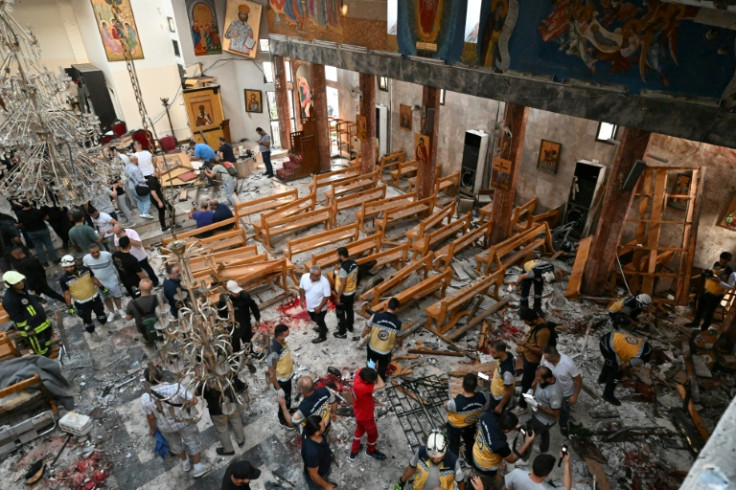
At the blood-stained Saint Elias church in Damascus, Umm George wept as she desperately searched for her son, who was among the worshippers when a suicide bomber struck on Sunday.
In vain, she tried to convince Syrian security forces, who had cordoned off the area, to let her into the church, whose windows had been blown out and whose interior was covered with debris and damaged pews.
"My son was praying in the church," she told AFP. "I tried to contact him but his mobile phone is off the air and I haven't been able to find him."
"I'm afraid I won't hear his voice again," she said, breaking down.
Panicked family members rushed to the church in the working-class Dwelaa district of the Syrian capital searching for loved ones after news of the blast spread.
The interior ministry said "a suicide attacker affiliated with the Daesh (IS) terrorist group" entered the church, "opened fire then blew himself up with an explosive belt" in an unprecedented attack inside a Syrian church since war erupted more than 14 years ago.
Authorities said more than 20 people were killed and dozens wounded.
AFP correspondents saw blood and human remains inside the devastated church, whose panels holding religious icons were scattered on the ground and its central chandelier shattered.
The blast sparked panic in the church, which had been full of worshippers including children and the elderly, an eyewitness said.
Lawrence Maamari, who was among those inside, said that "someone entered from outside carrying a weapon" and began shooting, adding that people "tried to stop him before he blew himself up".
Maamari said he helped move around 10 casualties from the scene, as local residents tried to help the wounded before ambulances and other emergency vehicles arrived.
Other worshippers were shocked, unable to comprehend what had happened, their faces filled with grief.
The force of the blast sent glass flying towards a shop opposite, where Ziad Helou, 40, said he heard gunfire then an explosion, and threw himself to the ground in fear.
"We saw fire in the church and the remains of wooden benches thrown all the way to the entrance," he said.
Several churches were damaged during Syria's war, which erupted in 2011, or attacks were carried out in their vicinity, but none were directly hit by such an attack.
The government of now-ousted ruler Bashar al-Assad long portrayed itself as a protector of minorities, who were targeted by numerous attacks during the conflict, many claimed by jihadist groups including IS.
The attack is also the first of its kind since the new authorities took over after Assad's December ouster, while the international community has repeatedly called for minorities to be protected.
"We were extremely afraid," said Helou.
"I remember the explosions during the war," he added.







